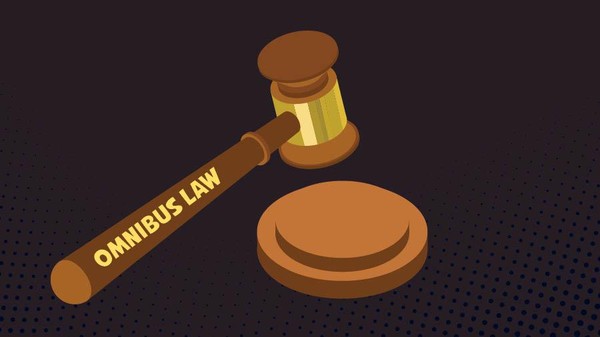Job Creation Law In accordance with Legislative Regulations
The Job Creation Law has been implemented for more than 2 years. If there are still people who protest then this is wrong, because the production is in accordance with statutory regulations. This law is very good for increasing investment and the Indonesian economy, so I hope no one opposes it.
The Job Creation Law deals with almost various fields. This law contains articles that deal with the employment, economic, MSME and investment sectors. It is hoped that the various articles in this law can improve various problems in Indonesia.
However, the Labor Party and trade unions challenged the Job Creation Law to the Constitutional Court (MK) and finally a formal test was held. The Constitutional Court again held a follow-up hearing on the formal review of Law Number 6 of 2023 concerning the Determination of Government Regulations in Lieu of Law Number 2 of 2022 concerning Job Creation into Law (Job Creation Law. This fourth session was scheduled to hear statements from the DPR and the President/ Government.
The President/Government was represented in delivering his statement by Asep N. Mulyana as Director General of Legislation and Regulations of the Ministry of Law and Human Rights.
This trial was held for four cases at once. First, Case Number 40/PUU-XXI/2023 which was filed by 121 Petitioners consisting of 10 trade unions and 111 workers. Second, Case Number 41/PUU-XXI/2023 which was filed by the Confederation of Indonesian Prosperous Trade Unions (KSBSI) represented by Elly Rosita Silaban (President of the National Executive Council) and Dedi Hardianti (Secretary General of the National Executive Council).
Third, Case Number 46/PUU-XXI/2023 which was filed by 14 legal entities. Fourth, Case Number 50/PUU-XXI/2023 which was filed by the Labor Party represented by Labor Party President Said Iqbal and Labor Party Secretary General Ferri Nuzarli.
Asep N. Mulyana in his statement representing the Government said, based on Article 52 paragraph (1) of the P3 Law, the Perppu must be submitted to the DPR in the following trial. This means that the first session of the DPR after the Perppu is enacted. Referring to such provisions, the submission of the Perppu to the DPR does not regulate the meaning of the discussion period, because it only regulates approval and not from the DPR alone. Furthermore, if approved by the DPR in a plenary session, the Perppu will be declared law.
Asep continued, the DPR’s quick response in the process of discussing and approving the Perppu to become Law 6/2023 is a manifestation of the shared views of the people’s representatives regarding the urgent and compelling conditions that must be taken by the government and to provide certainty regarding the policies that the government has made in the Perppu.
Next, regarding the establishment of the Job Creation Law, the Government stated that this was in accordance with the provisions of statutory regulations. Because a series of agendas have been carried out, namely on January 4 2023 several agendas have been carried out for the submission of Perppu, namely the formation of an inter-ministerial committee to enact the Perppu into law.
Then on January 5 2023, the draft law establishing the Perppu as a result of harmonization was submitted; January 9, 2023, the appointment of government representatives was carried out in the discussion of the bill establishing a Perppu in the DPR and the submission of the Perppu Bill to the DPR; until finally on March 27 2023 the DPR approved the stipulation of the Perppu and on March 31 2023 it was ratified by the President and promulgated by the Minister of State Secretary into law.
Regarding the meaning of urgent matters, the Government is guided by Constitutional Court Decisions Number 003/PUU-III/2005 and 138/PUU-VII/2009. In essence, it states that urgency is not always perceived as a state of danger at the level of a civil, military or war emergency. However, compelling urgency is the President’s subjective right to determine it and becomes objective after being approved by the DPR to enact it as law.
This means that trade unions and the Labor Party cannot demand the Job Creation Law because it is in accordance with statutory regulations. Where Indonesia is in a state of emergency due to the effects of the pandemic. When the pandemic hit for 3 years and had a negative impact on the country’s economy, the solution was to apply the Job Creation Law.
Meanwhile, Deputy Minister of Finance (Wamenkeu) Suahasil Nazara stated that there was high economic uncertainty due to facing the threat of a global recession. A third of countries in the world are threatened with recession, the impact of tightening monetary policy which is the impact of rising inflation conditions throughout the world. Rising inflation conditions disrupt price stability.
One thing that is important in Indonesia is business certainty. This is where the Job Creation Law is important. Its function is to create certainty so that Indonesia can face the threat of a world recession.
The Job Creation Law will save Indonesia from the threat of recession because there is business certainty for both local and foreign entrepreneurs. Local businesses can develop because there is an MSME cluster in this law. Where small and medium level entrepreneurs make their business easier, because there is free processing of business permit numbers (NIB) and MUI halal status.
With NIB, local entrepreneurs can develop their business because it is considered valid by the state and trusted by banks or finance companies. He can get a business capital loan and expand his business, so that it develops further and gets satisfactory results.
The Job Creation Law is in accordance with statutory regulations and is a savior for Indonesia from the threat of recession. All parties are expected to accept this law because it is in accordance with statutory regulations. No one else should demand it from the Constitutional Court because this law is important for the country’s economy.
